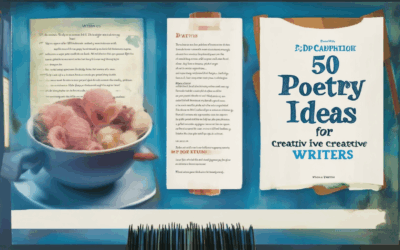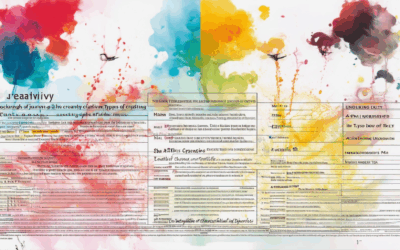Imaginative writing is a cornerstone of creativity, offering endless possibilities for young minds to explore and express themselves. For kids, the world is a canvas waiting to be painted with vivid stories, characters, and adventures. Whether they’re crafting tales about magical creatures or solving mysteries, imaginative writing helps develop critical thinking, communication skills, and a love for learning. This guide delves into a variety of imaginative writing ideas, designed to inspire, educate, and entertain. From simple prompts to complex story structures, we’ll explore creative writing ideas for kids of all ages, providing a wealth of resources to unlock their potential. Join us as we embark on a journey to foster creativity and unlock the boundless imagination of our future generations.
Key Takeaways
– Unleash Creativity with Freewriting: Dedicate 10 minutes to continuous writing without judgment to overcome blocks and spark ideas.
– Use Prompts as Catalysts: Guide your mind with specific questions or scenarios to enter a creative flow.
– Explore Sensory Details: Immersive descriptions of textures, sounds, and smells to build vivid scenes.
– Embrace Failure as Growth: Understand that mistakes often lead to breakthroughs and unique ideas.
– Broaden Perspectives with Diverse Literature: Exposure to varied genres and cultures fosters creativity and fresh perspectives.
– Experiment with Forms: Try poetry, scripts, or flash fiction to expand your creative range.
– Collaborate for Inspiration: Join writing groups to brainstorm and gain new perspectives.
– Journal Regularly: Document thoughts and observations to uncover hidden inspiration.
– Stay Open to Uncertainty: Allow yourself to write without fearing imperfection.
– Read Widely and Diversely: Immerse yourself in different cultures and genres to spark innovation.
– Set Creative Goals: Define objectives and track progress to stay motivated.
– Engage with Communities: Participate in challenges and forums to connect with fellow writers.
– Reflect on Personal History: Draw inspiration from past experiences for relatable stories.
– Practice Mindfulness: Clear your mind before writing to enhance focus and creativity.
– Stay Curious and Open-Minded: Approach writing as an exploration with a growth mindset.

What Are Some Effective Ways To Inspire Imaginative Writing In Children?
- Engage With Interactive Activities: Create storytelling games or role-playing scenarios where children can act out characters and situations. This encourages them to think creatively and develop unique narratives.
- Use Visual Prompts: Provide images or art that sparks imagination. Ask children to describe what they see or create a story based on the visuals. This helps develop descriptive skills and storytelling abilities.
- Creative Writing Exercises: Introduce exercises like “Write Your Own Fairy Tale” or “Imagine You’re a Robot.” These exercises push children to think outside the box and explore fantastical ideas.
- Read Aloud Together: Sharing compelling stories from books can inspire children to want to create their own tales. Discuss characters, settings, and plot twists to encourage analytical thinking and imaginative expansion.
- Foster Collaborative Projects: Have groups work together to create a shared story or collaborative artwork. This teaches teamwork while allowing individual imaginations to flourish.
- Provide Constructive Feedback: When reviewing their writing, focus on encouraging additions or changes that enhance their imaginative ideas rather than critiquing negatively.
- Encourage Personal Journals: Give children a space to document their thoughts, adventures, and imaginary worlds. This helps develop a love for writing and storytelling over time.
- Host Writing Workshops Or Contests: Organize events where children can showcase their writing or participate in challenges that reward creativity and originality.
- Establish Reading Circles: Create a group where children read and discuss stories, fostering a community that values creative expression and imaginative writing.
Silken Drum supports these efforts by providing a platform for creative expression and learning. Explore our resources and community to inspire and grow your child’s imaginative writing skills. Visit Silken Drum today!
Helping Your Child Develop Imaginative Writing Skills
To foster imaginative writing in your child, consider implementing the following structured approach:
- Daily Writing Practice : Set aside time each day for creative writing. Use prompts like “Write about a magical animal” or “Describe a futuristic city.”
- Inspire Through Reading : Choose books with rich descriptions and creative themes, such as adventure or fantasy, to spark your child’s imagination.
- Engage in Word Games : Play games like Scrabble or crosswords to enhance vocabulary and creativity, supporting your child’s ability to think innovatively.
- Provide Constructive Feedback : Offer encouragement and constructive criticism to build confidence and refine their writing skills.
- Collaborative Storytelling : Involve your child in group activities where everyone contributes to a shared story, fostering teamwork and inspiration.
- Explore Different Genres : Introduce various genres like mystery, fantasy, or sci-fi to broaden their expressive horizons.
- Use Writing Journals : Encourage journaling as a means to experiment freely, providing a safe space for creative exploration.
- Attend Workshops : Look for local programs at libraries or art centers to offer structured learning opportunities.
- Utilize Interactive Tools : Explore online tools that aid in visualizing stories or creating comics, suitable for young children.
- Build Confidence Through Sharing : Create a supportive environment for sharing their work, whether at home or through local contests.
By combining these strategies, you can effectively nurture your child’s imaginative writing abilities, guiding them towards a richer creative expression.

Imaginative Writing Ideas to Spark Creativity
Here are some imaginative writing ideas to inspire your next project:
- Setting-Based Prompts :
- Write about a secret door hidden in a library that leads to a magical world.
- Describe a futuristic city where buildings float and change colors with the time of day.
- Create a scene in a haunted forest where every tree whispers a different story.
- Character-Driven Plots :
- Develop a character who discovers they have a superpower but must hide it from others.
- Explore the life of an object, such as a cursed sword that yearns to be free.
- Write about a person who wakes up in someone else’s body and must figure out how to return home.
- Object with Hidden Powers :
- A mysterious artifact that grants wishes but changes the user’s luck forever.
- A necklace that allows you to travel through time by focusing on your memories.
- A book of shadows that reveals the secrets of a forgotten village.
- Time Manipulation :
- Rewrite history by preventing a major historical event.
- Explore what happens if you could relive your favorite memory perfectly.
- Imagine a world where people can manipulate time to speed up or slow down their lives.
- Abstract Concepts Made Tangible :
- Write about love as a physical force that can bend reality.
- Depict fear as a creature that haunts your nightmares until you confront it.
- Show hope as a light that guides lost souls through dark valleys.
- Reimagine Classic Myths :
- Retell the story of Icarus but end it differently, perhaps with a happy ending.
- Rewrite the Rapunzel tale where she uses her hair to heal instead of escape.
- Modernize the Cinderella story by setting it in a dystopian world.
- Genre Blending :
- Combine science fiction and romance in a story about an alien planet where love transcends species.
- Mix horror and comedy by writing about a group trying to survive a haunted house while dealing with absurd challenges.
- Merge fantasy and realism by describing a world where magic exists alongside everyday life.
For more resources, visit Silken Drum and explore our blog section for tips and inspiration. Join our community to share your own creative writing ideas and connect with fellow writers.
If you enjoyed these prompts, check out similar articles on Writer’s Digest and The Write Practice for further guidance and inspiration.

What Are Some Effective Ways To Inspire Imaginative Writing?
Here are 10 creative strategies to unlock your imaginative potential:
- Freewriting : Dedicate 10 minutes to write continuously without stopping. This helps overcome writer’s block and sparks ideas.
- Set Writing Prompts : Use specific questions or scenarios to guide your mind into a creative state.
- Explore Sensory Details : Describe textures, sounds, and smells to immerse yourself in a scene.
- Embrace Failure : Understand that great ideas often come from unexpected mistakes.
- Read Diverse Literature : Exposure to various genres and cultures broadens your perspective.
- Experiment With Forms : Try writing in different styles, like poetry or scripts.
- Reflect On Personal History : Draw inspiration from your past experiences and memories.
- Collaborate With Others : Work with fellow writers to spark new ideas.
- Journal Regularly : Keep a notebook to document thoughts and observations.
- Embrace Uncertainty : Allow yourself to write without worrying about perfection.
For more resources and community support, visit Silken Drum and explore our creative writing tools and forums. Additionally, check out Poets & Writers and The Writer’s Bloc for further inspiration and guidance.
Imaginative Writing Ideas to Spark Creativity
Imaginative writing is a powerful tool for unlocking creativity and pushing boundaries in your storytelling. Whether you’re a seasoned writer or just beginning, these ideas can help you find fresh perspectives and inspire your next project.
- Freewrite Without Judgement: Set aside time to write continuously for 15 minutes without editing or worrying about perfection. This technique helps quiet the critical voice and allows your mind to wander freely.
- Use Prompts as Catalysts: Explore writing prompts designed to spark creativity. Websites like The Write Practice offer daily prompts that guide you into uncharted territory.
- Experiment with Genres: Step out of your comfort zone by trying a completely different genre. Read works from Writer’s Digest to discover new styles and approaches.
- Collaborate with Others: Join writing groups or forums, such as those on Silken Drum , to brainstorm ideas and gain new perspectives.
- Journal Your Thoughts: Keep a writing journal to document daily observations, emotions, or ideas. This habit often leads to unexpected inspiration and story seeds.
- Try New Writing Forms: Explore forms like flash fiction, poetry, or scriptwriting. Platforms like Silken Drum Workshops offer resources to get started.
- Revisit Old Drafts: Sometimes, stepping away from a piece and returning to it later can reveal new angles or improvements. Review your past work with a fresh eye.
- Engage with Communities: Participate in writing challenges or contests hosted by Silken Drum to meet fellow writers and receive feedback.
- Set Creative Goals: Define specific objectives for your writing, whether it’s completing a novel or experimenting with a new style. Track your progress to stay motivated.
- Explore Personal History: Reflect on your past experiences and memories to mine unique material. This can lead to deeply personal and relatable stories.
- Embrace Failure as Feedback: View writing mistakes as opportunities to learn and grow. Every failed attempt brings you closer to success.
- Seek Inspiration Everywhere: Draw motivation from nature, art, music, or everyday moments. Keep a visual inspiration file to fuel your creativity.
- Read Widely and Diversely: Immerse yourself in different cultures, perspectives, and genres. Reading broadens your horizons and inspires fresh ideas.
By incorporating these imaginative writing ideas into your routine, you can unlock new dimensions of creativity and elevate your writing to extraordinary levels. Join the Silken Drum community today to connect with fellow writers and share your creations.

How Can I Enhance My Imaginative Writing Skills?
Imaginative writing is a skill that can be cultivated through dedication, practice, and a willingness to explore new ideas. Here are some effective strategies to help you develop your imaginative writing abilities:
- Daily Writing Practice: Set aside time each day to write. Even short sessions can help strengthen your creativity. Try journaling, writing brief stories, or experimenting with different writing styles.
- Experiment with Creative Exercises: Engage in exercises like free-writing, where you write continuously without stopping to let your mind wander freely. Another exercise is to write a story based on a single sentence or phrase.
- Broaden Your Horizons: Read widely, watch movies, visit museums, and explore different cultures. These experiences can spark new ideas and inspire your writing.
- Analyze Successful Writers: Study the works of renowned authors to understand their techniques, themes, and storytelling styles. Learn from their approaches to fuel your own creativity.
- Seek Feedback: Share your writing with trusted friends, mentors, or writing groups. Constructive criticism can provide valuable insights and help you refine your style.
- Set Achievable Goals: Define specific objectives for your writing, such as completing a short story or exploring a new genre. Break these goals into smaller, manageable tasks.
- Explore Different Genres: Push yourself to try genres outside your comfort zone, such as fantasy, sci-fi, or memoir. This can challenge your creativity and broaden your horizons.
- Join a Writing Community: Participate in writing groups or online forums to connect with other creators. Collaboration and shared experiences can inspire new ideas and provide support.
- Practice Mindfulness: Before writing, take a few minutes to meditate or journal. This can help clear your mind and increase your focus, making it easier to tap into creative thoughts.
- Stay Curious and Open-Minded: Approach writing as an exploration. Stay curious about the world around you and remain open to unexpected ideas. This mindset can lead to more innovative and compelling narratives.
By consistently applying these strategies, you can unlock your imagination and become a more skilled and confident imaginative writer. Remember, writing is a journey, and every step forward is a victory.




0 Comments